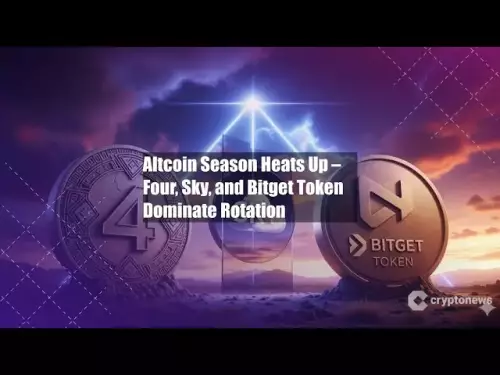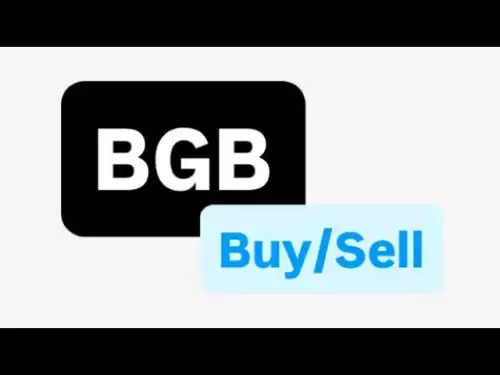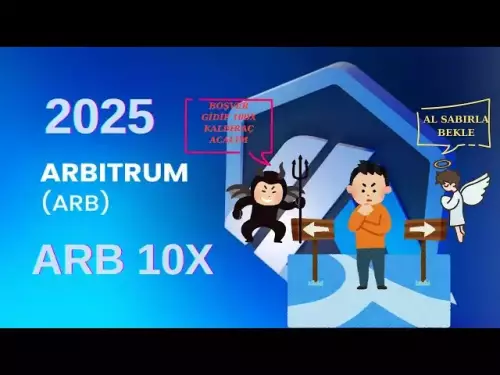-
 Bitcoin
Bitcoin $111000
1.68% -
 Ethereum
Ethereum $4289
-0.42% -
 XRP
XRP $2.830
2.60% -
 Tether USDt
Tether USDt $1.000
-0.01% -
 BNB
BNB $849.8
0.18% -
 Solana
Solana $208.0
4.92% -
 USDC
USDC $0.9999
0.00% -
 Dogecoin
Dogecoin $0.2130
1.23% -
 TRON
TRON $0.3371
0.04% -
 Cardano
Cardano $0.8289
3.22% -
 Chainlink
Chainlink $23.25
3.34% -
 Hyperliquid
Hyperliquid $44.68
3.12% -
 Ethena USDe
Ethena USDe $1.001
0.01% -
 Sui
Sui $3.318
2.93% -
 Bitcoin Cash
Bitcoin Cash $580.2
6.25% -
 Stellar
Stellar $0.3633
2.30% -
 Avalanche
Avalanche $24.40
5.43% -
 Hedera
Hedera $0.2200
3.20% -
 Cronos
Cronos $0.2739
3.94% -
 UNUS SED LEO
UNUS SED LEO $9.551
0.01% -
 Litecoin
Litecoin $111.0
1.76% -
 Toncoin
Toncoin $3.160
1.58% -
 Shiba Inu
Shiba Inu $0.00001235
2.28% -
 Polkadot
Polkadot $3.800
2.85% -
 Uniswap
Uniswap $9.501
1.73% -
 Bitget Token
Bitget Token $5.165
10.67% -
 World Liberty Financial
World Liberty Financial $0.2236
-9.69% -
 Dai
Dai $0.9998
-0.01% -
 Monero
Monero $267.2
2.64% -
 Aave
Aave $313.6
2.60%
What is the difference between a dApp and a smart contract?
dApps rely on smart contracts to execute decentralized logic, combining user-friendly interfaces with blockchain-based automation for trustless interactions.
Sep 03, 2025 at 09:00 am
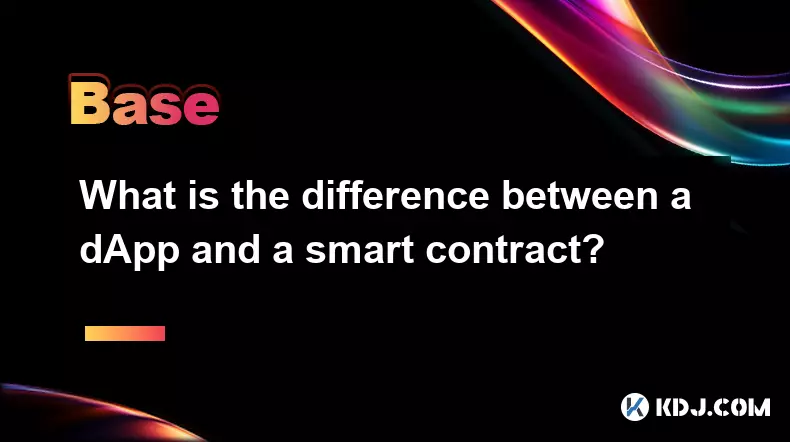
Understanding the Core Concepts in Decentralized Applications
1. A decentralized application, commonly referred to as a dApp, operates on a blockchain network rather than a centralized server. These applications leverage the transparency, immutability, and trustless nature of blockchain technology to provide services without intermediaries. dApps can range from financial platforms to gaming ecosystems and social networks, all built to function autonomously.
2. Smart contracts are self-executing agreements written in code and deployed on a blockchain. They automatically enforce the rules and conditions defined within them. Once deployed, they cannot be altered, ensuring that all parties adhere to the agreed-upon logic without relying on a third party for enforcement.
3. While both dApps and smart contracts exist on blockchains, their roles differ significantly. A dApp represents the entire user-facing application, including the frontend interface, backend logic, and interaction with one or more smart contracts. In contrast, a smart contract is a specific piece of code that handles particular functions such as token transfers, voting mechanisms, or lending protocols.
4. The relationship between dApps and smart contracts is similar to that of a website and its backend scripts. A website uses server-side code to process data, while a dApp uses smart contracts to execute operations on-chain. Users interact with the dApp through a graphical interface, but the actual transaction logic is processed by the underlying smart contracts.
5. Not all smart contracts are part of dApps. Some smart contracts operate independently, such as those used for token creation or automated payments. However, every dApp relies on at least one smart contract to perform critical blockchain-based functions.
Architectural Differences Between dApps and Smart Contracts
1. dApps consist of multiple components: a frontend UI built with standard web technologies like HTML, CSS, and JavaScript; a backend that may include off-chain databases or APIs; and one or more smart contracts that interface with the blockchain. This architecture allows users to interact seamlessly while ensuring key operations remain decentralized.
2. Smart contracts are purely code-based and run exclusively on the blockchain. They do not have a user interface and cannot be modified after deployment. Their execution is triggered by transactions sent from external accounts or other contracts, making them deterministic and transparent to all network participants.
3. The development lifecycle of a dApp includes UI/UX design, integration with wallet providers like MetaMask, testing across networks, and deployment to decentralized storage systems such as IPFS. Smart contract development focuses on writing secure, gas-efficient code using languages like Solidity or Vyper, followed by rigorous auditing and deployment to the blockchain.
4. Security considerations differ between the two. dApps must protect against frontend attacks such as phishing or malicious scripts, while smart contracts are vulnerable to logical flaws, reentrancy attacks, and overflow errors. A compromised smart contract can lead to irreversible loss of funds, even if the dApp’s frontend is secure.
5. Upgradability is another key distinction. Most dApps can update their frontend or backend services freely, but smart contracts are typically immutable. Developers use patterns like proxy contracts to enable upgrades, but this adds complexity and potential attack vectors.
Functional Roles in the Blockchain Ecosystem
1. dApps serve as the primary point of interaction for end users in the decentralized world. They provide accessible interfaces for activities such as trading tokens on decentralized exchanges, borrowing assets through lending platforms, or participating in governance votes.
2. Smart contracts act as the engine behind these operations, executing transactions based on predefined rules. For example, when a user swaps tokens on Uniswap, the dApp facilitates the interface, but the actual exchange logic is handled by a smart contract that calculates prices and transfers assets.
p>3. Multiple smart contracts often work together within a single dApp. A DeFi platform might have separate contracts for staking, yield farming, and governance, each interacting with the others in a modular fashion. This separation enhances security and maintainability.
4. dApps can interact with smart contracts across different protocols. A wallet dApp might allow users to connect to various DeFi platforms, NFT marketplaces, and prediction markets, all powered by distinct sets of smart contracts. This interoperability is a hallmark of the open blockchain ecosystem.
5. The success of a dApp depends not only on its usability but also on the reliability of its underlying smart contracts. High-profile exploits, such as the DAO hack or the Parity wallet freeze, underscore the importance of secure contract design in maintaining trust and functionality.
Frequently Asked Questions
Can a smart contract exist without a dApp?Yes, a smart contract can operate independently without any frontend interface. Many token contracts, for example, are deployed and used directly through wallet software or blockchain explorers without an associated dApp.
Do all dApps require smart contracts?In the context of blockchain-based dApps, yes. A dApp must interact with the blockchain to perform decentralized functions, which requires smart contracts to handle on-chain logic and state changes.
Who can deploy a smart contract?Any individual or entity with the technical knowledge and sufficient funds to pay network fees can deploy a smart contract on a public blockchain like Ethereum, provided they follow the network’s technical standards.
Are dApps always open source?While many dApps in the crypto space are open source to promote transparency and community trust, it is not a strict requirement. Some projects may keep their frontend or backend components proprietary, though this is less common in decentralized ecosystems.
Disclaimer:info@kdj.com
The information provided is not trading advice. kdj.com does not assume any responsibility for any investments made based on the information provided in this article. Cryptocurrencies are highly volatile and it is highly recommended that you invest with caution after thorough research!
If you believe that the content used on this website infringes your copyright, please contact us immediately (info@kdj.com) and we will delete it promptly.
- Shiba Inu: Decentralization and Community Focus – A New Yorker's Take
- 2025-09-03 12:25:15
- Anthropic's $13B Bet: High Stakes in the AI Safety Game
- 2025-09-03 12:45:12
- Crypto, Congressman Collins, and Institutional Sentiment: A New York Minute on Market Influence
- 2025-09-03 10:25:13
- PUMP Price Surges: Pump.fun's User Growth Strategy Under the Microscope
- 2025-09-03 10:45:11
- BullZilla, Meme Coins, and Cardano: Navigating the 2025 Crypto Landscape
- 2025-09-03 12:45:12
- COVID-19'S GRIM TOLL: Nuevo León's Fallen Doctors
- 2025-09-03 12:50:11
Related knowledge
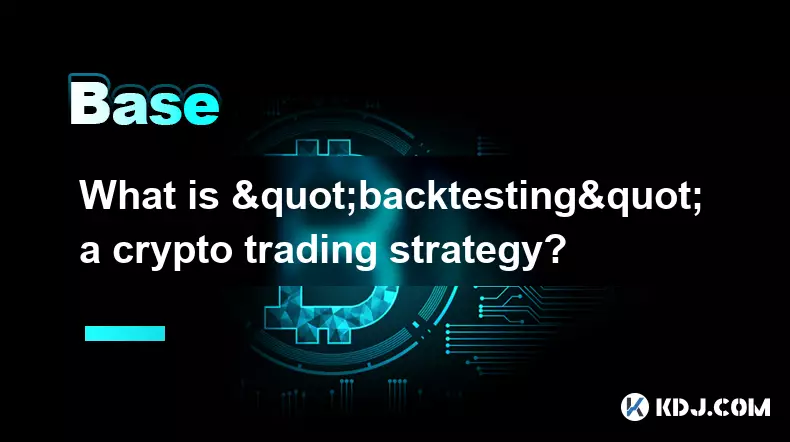
What is "backtesting" a crypto trading strategy?
Sep 03,2025 at 10:55am
Understanding Backtesting in Crypto TradingBacktesting is the process of evaluating a trading strategy by applying it to historical market data. Trade...
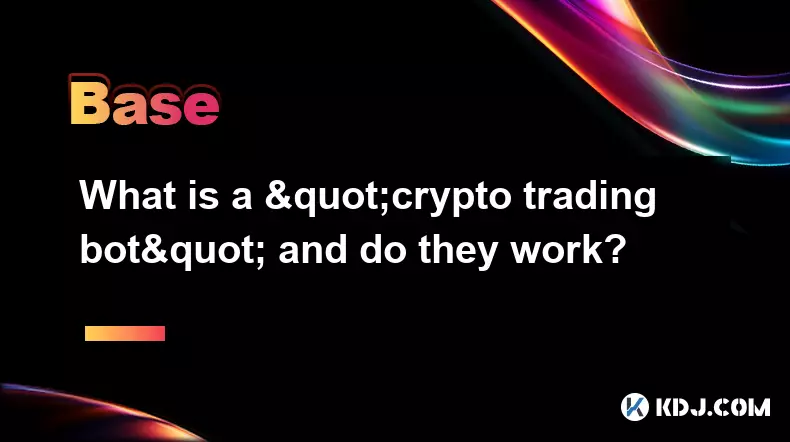
What is a "crypto trading bot" and do they work?
Sep 02,2025 at 04:19pm
Understanding Crypto Trading Bots1. A crypto trading bot is a software application designed to automate the process of buying and selling cryptocurren...
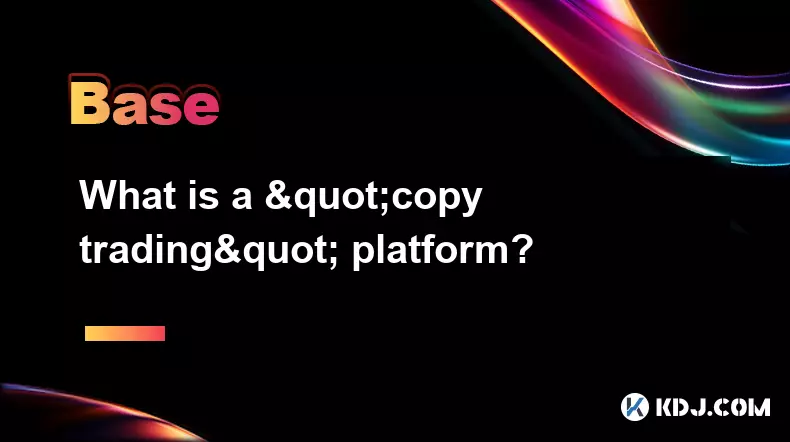
What is a "copy trading" platform?
Sep 02,2025 at 07:00pm
Understanding Copy Trading in the Cryptocurrency Space1. A copy trading platform allows users to automatically replicate the trades of experienced inv...
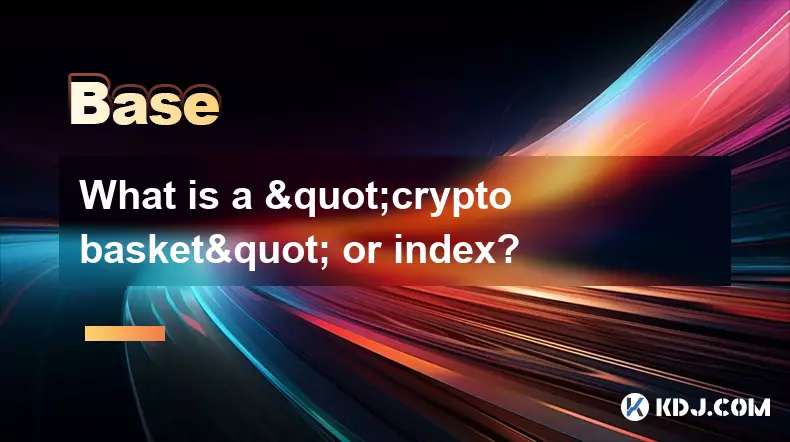
What is a "crypto basket" or index?
Sep 03,2025 at 07:01am
Understanding Crypto Baskets and Their Role in Digital Asset Investment1. A crypto basket refers to a curated collection of multiple cryptocurrencies ...
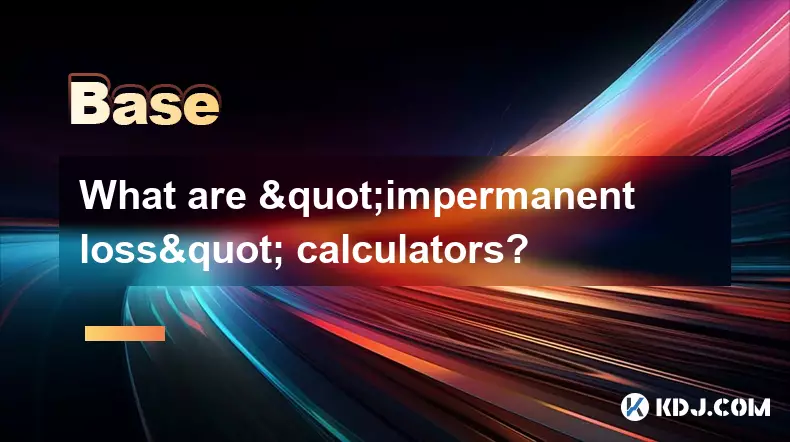
What are "impermanent loss" calculators?
Sep 03,2025 at 12:00pm
Understanding Impermanent Loss in Decentralized Finance1. Impermanent loss is a phenomenon that affects liquidity providers in decentralized exchanges...
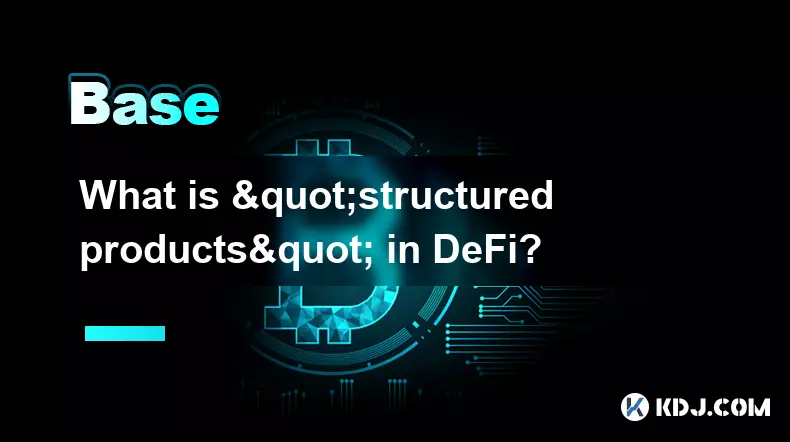
What is "structured products" in DeFi?
Sep 02,2025 at 11:01pm
Understanding Structured Products in DeFi1. In decentralized finance (DeFi), structured products refer to customized financial instruments that combin...

What is "backtesting" a crypto trading strategy?
Sep 03,2025 at 10:55am
Understanding Backtesting in Crypto TradingBacktesting is the process of evaluating a trading strategy by applying it to historical market data. Trade...

What is a "crypto trading bot" and do they work?
Sep 02,2025 at 04:19pm
Understanding Crypto Trading Bots1. A crypto trading bot is a software application designed to automate the process of buying and selling cryptocurren...

What is a "copy trading" platform?
Sep 02,2025 at 07:00pm
Understanding Copy Trading in the Cryptocurrency Space1. A copy trading platform allows users to automatically replicate the trades of experienced inv...

What is a "crypto basket" or index?
Sep 03,2025 at 07:01am
Understanding Crypto Baskets and Their Role in Digital Asset Investment1. A crypto basket refers to a curated collection of multiple cryptocurrencies ...

What are "impermanent loss" calculators?
Sep 03,2025 at 12:00pm
Understanding Impermanent Loss in Decentralized Finance1. Impermanent loss is a phenomenon that affects liquidity providers in decentralized exchanges...

What is "structured products" in DeFi?
Sep 02,2025 at 11:01pm
Understanding Structured Products in DeFi1. In decentralized finance (DeFi), structured products refer to customized financial instruments that combin...
See all articles





















